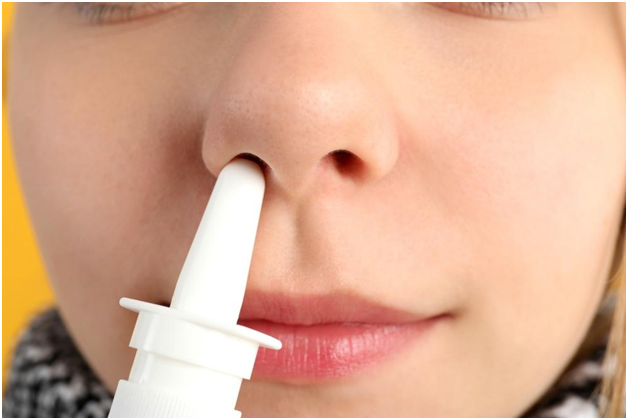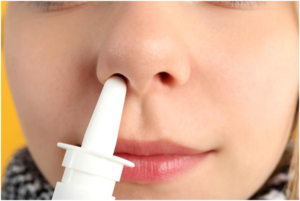Nasal congestion arises when the nasal passages become blocked, making it more challenging to breathe through the nose. Nasal sprays are a common method to assist with this. These sprays have different ways of working, depending on what ingredients they contain and the type of congestion they are intended for.
Generally, they aim to reduce swelling in the nose’s lining or to have a soothing effect on the nasal cavity. With various types of nasal sprays available to help with a stuffy nose, including those you can get with a prescription and those you can buy over the counter, understanding their potential effects with regular use is important.
Exploring the Effectiveness of Nasal Sprays
Nasal decongestants are a popular choice for individuals seeking relief from a blocked or runny nose, as they can help to lessen swelling and congestion in the nasal passages. These medications are often used for common issues like colds, flu, and hay fever. However, it is important to note that not all nasal sprays work the same way to ease nasal congestion.
Over-the-counter (OTC) nasal sprays are readily available and can provide quick, initial relief from a stuffy nose. These sprays often contain chemicals such as oxymetazoline and naphazoline. When sprayed into the nose, they help to reduce congestion by narrowing the swollen blood vessels in the nasal lining.
While these OTC options can offer relief in the short term, using them for more than a few days can sometimes lead to a rebound effect, where the nasal congestion actually worsens instead of improving. Furthermore, using these sprays excessively might even have a negative effect on the nasal membranes.
Rhinitis Medicamentosa: The Rebound Effect
Prolonged use of decongestant nasal sprays beyond a few consecutive days can sometimes lead to an unwanted effect known as rebound congestion or rhinitis medicamentosa. This occurs as a response to the continued use of these medications in the nasal passages.
What is Rhinitis Medicamentosa?
Rhinitis medicamentosa describes a condition where the nasal lining, or mucosa, becomes inflamed due to the prolonged use of nasal decongestants, such as certain nasal sprays. This effect has been noted with the overuse of nasal sprays that contain ingredients derived from ephedrine. In rhinitis medicamentosa, a person might experience a stuffy or runny nose without other symptoms typically associated with a cold, flu, or allergies. This condition is also commonly referred to as rebound congestion, highlighting the way the congestion returns and often worsens as the spray’s initial effects diminish.
Who is at Risk?
The potential for rhinitis medicamentosa exists in all individuals who use nasal decongestant sprays, whether in spray, drop, or gel form. However, it is more commonly seen in individuals who have used these products for a week to ten days or even longer. This means that frequent users who exceed the recommended duration of application are at a higher likelihood of experiencing this rebound effect.
Recognising the Symptoms and Causes
Recognising rhinitis medicamentosa involves being aware of the specific nasal symptoms that arise from prolonged decongestant nasal spray use.
Symptoms of Rhinitis Medicamentosa
The primary indicator of rhinitis medicamentosa is persistent nasal congestion. Alongside this, individuals might also experience itchy nasal passages, a runny nose, and sneezing. Unlike other forms of nasal issues, rhinitis medicamentosa typically focuses its effects on the nose, without involving symptoms that affect the eyes, ears, or throat.
Drugs That Trigger Rebound Congestion
The overuse of nasal sprayscontaining certain medications can lead to rhinitis medicamentosa. Common ingredients found in these sprays that are known to trigger this rebound effect include substances such as oxymetazoline and phenylephrine.
Being aware of these active components in over-the-counter nasal decongestants is important for understanding the potential for this condition to develop with extended use.
Diagnosing Rhinitis Medicamentosa
Healthcare providers can often determine if someone has rhinitis medicamentosa by asking about their symptoms and their history of using nasal sprays. It is really important for individuals to be truthful with their healthcare provider about how often they have been using spray decongestants. To confirm the condition or to rule out other possibilities like a cold, the provider might also examine the person’s nasal passages and throat.
Addressing Rebound Congestion

Addressing the issue of rebound congestion often involves a plan to gradually decrease the use of the nasal spray that is contributing to the problem. For those who have only been using a decongestant nasal spray for a short period, such as to manage symptoms of a recent cold or flu, stopping its use might be manageable without significant issues. However, for individuals who have been using these sprays for a longer duration, it is advisable to work with a healthcare provider to create a strategy for stopping.
To help manage nasal congestion as the use of decongestant sprays is reduced, alternative methods can also be considered. These include trying other types of medications, which have different ingredients and may not carry the same risk of rebound. Switching to a nasal saline solution, like a rinse or spray, can also help by flushing the nasal passages.
Preventing Nasal Spray Addiction
Preventing dependence on nasal sprays and the associated rebound congestion is crucial for maintaining nasal health. A key step is to adhere strictly to the usage instructions provided with any nasal spray. Many products include guidance on how to use the nasal spray and the duration of use, which should be carefully followed to minimise the risk of adverse effects.
Some individuals might consider using saline-only sprays as an alternative to medicated decongestant sprays to avoid issues like rebound congestion. These saline solutions can help moisturise the nasal passages. However, they may not be suitable for everyone, as some individuals could have sensitivities to them, and certain causes of congestion might not respond to simple moisturisation.
If you find yourself frequently bothered by allergy symptoms and are seeking effective relief to better manage your day, consider Sato Nazal Spray. Among the many nasal decongestant options available in Singapore, this Japanese nasal spray is designed to provide rapid relief from allergy symptoms, potentially allowing you to continue your daily activities with ease.
However, if nasal congestion is a recurring or long-lasting problem, consulting a healthcare professional is advised, as it could indicate a more serious underlying issue needing a different approach.




